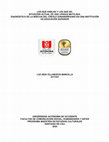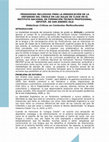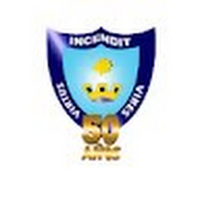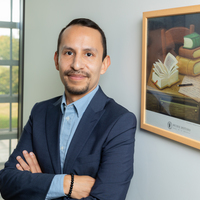Trabajos de Grado by LUZ AIDA VILLANUEVA MANCILLA

T11221 Los que hablan y los que no., 2024
The study examined the preservation of Raizal linguistic identity in San Andrés Islas, focusing
... more The study examined the preservation of Raizal linguistic identity in San Andrés Islas, focusing
on the progressive loss of San Andrés Creole in academic and everyday settings. Its objective
was to diagnose the gaps that exist between those who speak San Andres Creole as their
mother tongue and those who do not, at the National Institute of Professional Technical Training - INFOTEP in San Andrés Islas Colombia, from the perspective of Cultural Studies and using
the technique of survey and case study, for the design of a protocol for the inclusion of the
Raizal language in the oral communication of the academic environment.
The communicative dynamics at the National Institute of Professional Technical Training
(INFOTEP) were analyzed, identifying gaps, called 'spiez', between speakers and non
speakers of this mother tongue. About 36% of those surveyed do not master San Andres
Creole, mainly attributed to the lack of learning opportunities since childhood and the lack of
interest in acquiring basic knowledge. Interactions in San Andres Creole are limited to informal
and academic contexts, where the greatest communicative difficulties arise. These gaps affect
the spontaneity and fluidity of conversations, generating feelings of helplessness and exclusion.
A linguistic inclusion protocol is proposed that emphasizes the need for support resources and
comprehensive training to establish an inclusive and diverse educational community that values
the linguistic and cultural richness of the region. This protocol seeks to encourage active
participation, promote mutual respect and equal opportunities, and raise awareness about the
importance of linguistic and cultural inclusion in the academic field.
This work shows the current situation of the mother tongue of the Archipelago department in
the higher education environment, the relational distances and the inconveniences in
communication between those who speak and those who do not, after a past that challenged,
violated and mutilated the identity of the Raizal community in their language, religion and
education.

El trabajo pretende aportar al campo de la sociolingüística del territorio Insular Colombiano, la... more El trabajo pretende aportar al campo de la sociolingüística del territorio Insular Colombiano, la identidad de su lengua nativa y las actitudes lingüísticas con respecto al creole sanandresano, para el desarrollo de estrategias, herramientas decolonizadoras y de convergencia entre las multiculturas, que se relacionan en las aulas de clases de la institución de Educación superior propia de la isla de San Andrés, el Instituto Nacional de Formación Técnica Profesional INFOTEP. Está concebido, con miras a exponer una problemática de prácticas contrahegemónicas en torno a las lenguas ancestrales, identificar la resistencia que ha tenido la lengua creole en las aulas de clases en la educación superior y la urgencia de proponer la implementación de metodología pedagógica crítica para el creole, que a través de los currículos académicos de las diferentes carreras, que ofrece el Instituto Nacional de Formación Técnica Profesional INFOTEP sirvan de herramientas para reducir la brecha relacional, actitudinal y comunicativa tanto escrita como oral en las aulas de clases. Por medio de la metodología de estudio de casos, se presenta la situación actual de las relaciones entre estudiantes y docentes bilingües para la implementación de acciones que posibiliten el cierre de brechas en la comunicación.
Trabajo de Campo by LUZ AIDA VILLANUEVA MANCILLA
Libros y Capítulos de Libros by LUZ AIDA VILLANUEVA MANCILLA











Uploads
Trabajos de Grado by LUZ AIDA VILLANUEVA MANCILLA
on the progressive loss of San Andrés Creole in academic and everyday settings. Its objective
was to diagnose the gaps that exist between those who speak San Andres Creole as their
mother tongue and those who do not, at the National Institute of Professional Technical Training - INFOTEP in San Andrés Islas Colombia, from the perspective of Cultural Studies and using
the technique of survey and case study, for the design of a protocol for the inclusion of the
Raizal language in the oral communication of the academic environment.
The communicative dynamics at the National Institute of Professional Technical Training
(INFOTEP) were analyzed, identifying gaps, called 'spiez', between speakers and non
speakers of this mother tongue. About 36% of those surveyed do not master San Andres
Creole, mainly attributed to the lack of learning opportunities since childhood and the lack of
interest in acquiring basic knowledge. Interactions in San Andres Creole are limited to informal
and academic contexts, where the greatest communicative difficulties arise. These gaps affect
the spontaneity and fluidity of conversations, generating feelings of helplessness and exclusion.
A linguistic inclusion protocol is proposed that emphasizes the need for support resources and
comprehensive training to establish an inclusive and diverse educational community that values
the linguistic and cultural richness of the region. This protocol seeks to encourage active
participation, promote mutual respect and equal opportunities, and raise awareness about the
importance of linguistic and cultural inclusion in the academic field.
This work shows the current situation of the mother tongue of the Archipelago department in
the higher education environment, the relational distances and the inconveniences in
communication between those who speak and those who do not, after a past that challenged,
violated and mutilated the identity of the Raizal community in their language, religion and
education.
Trabajo de Campo by LUZ AIDA VILLANUEVA MANCILLA
Libros y Capítulos de Libros by LUZ AIDA VILLANUEVA MANCILLA
on the progressive loss of San Andrés Creole in academic and everyday settings. Its objective
was to diagnose the gaps that exist between those who speak San Andres Creole as their
mother tongue and those who do not, at the National Institute of Professional Technical Training - INFOTEP in San Andrés Islas Colombia, from the perspective of Cultural Studies and using
the technique of survey and case study, for the design of a protocol for the inclusion of the
Raizal language in the oral communication of the academic environment.
The communicative dynamics at the National Institute of Professional Technical Training
(INFOTEP) were analyzed, identifying gaps, called 'spiez', between speakers and non
speakers of this mother tongue. About 36% of those surveyed do not master San Andres
Creole, mainly attributed to the lack of learning opportunities since childhood and the lack of
interest in acquiring basic knowledge. Interactions in San Andres Creole are limited to informal
and academic contexts, where the greatest communicative difficulties arise. These gaps affect
the spontaneity and fluidity of conversations, generating feelings of helplessness and exclusion.
A linguistic inclusion protocol is proposed that emphasizes the need for support resources and
comprehensive training to establish an inclusive and diverse educational community that values
the linguistic and cultural richness of the region. This protocol seeks to encourage active
participation, promote mutual respect and equal opportunities, and raise awareness about the
importance of linguistic and cultural inclusion in the academic field.
This work shows the current situation of the mother tongue of the Archipelago department in
the higher education environment, the relational distances and the inconveniences in
communication between those who speak and those who do not, after a past that challenged,
violated and mutilated the identity of the Raizal community in their language, religion and
education.